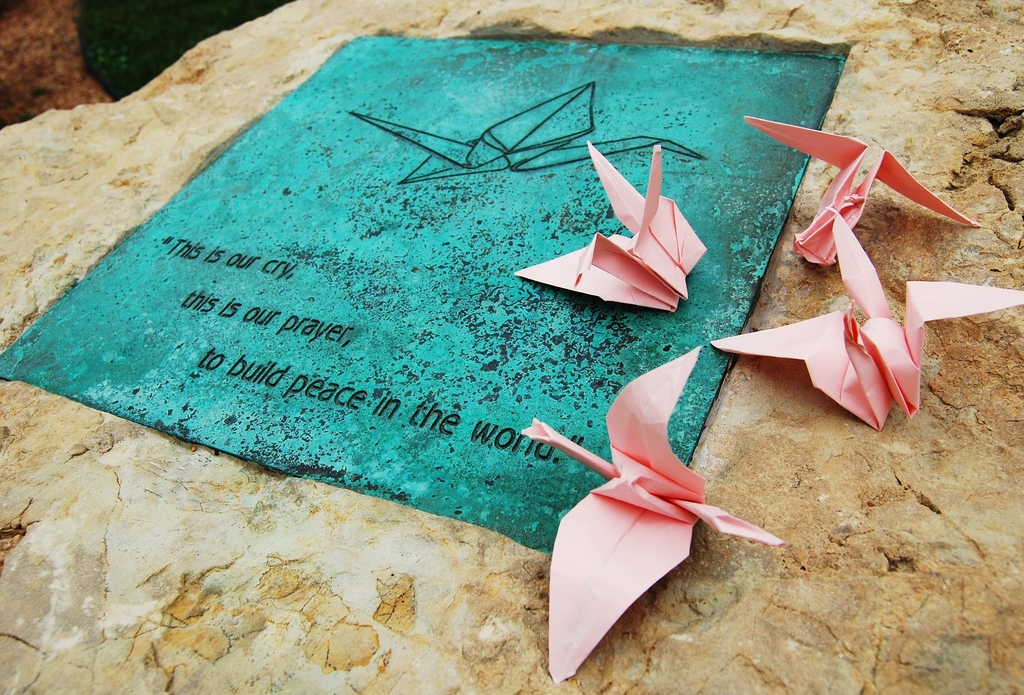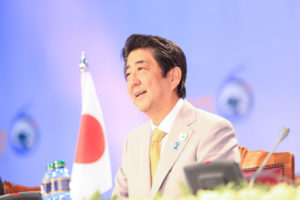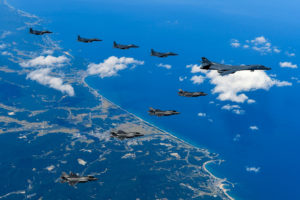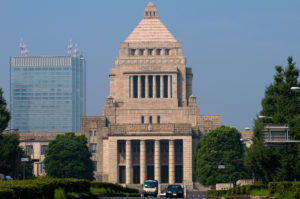A Case for Japan’s Remilitarization
 https://flic.kr/p/5swpgR
https://flic.kr/p/5swpgR

Following a landslide election victory at the end of October 2017, Japanese Prime Minister Shinzo Abe promised to challenge what he considered the country’s pressing national crises: persistent deflation, an aging population and the looming threat of North Korea’s nuclear missile development. In his decision to call a snap election, Abe shifted the political landscape by defeating the conservative Party of Hope and subsequently securing a two-thirds “super majority” with 312 seats in the 465-seat lower house of Parliament, otherwise known as the Diet.
Abe’s election call has proven to be highly tactical during a time when his popularity rating was at an all time low after months of being plagued by scandals. Despite a 51% disapproval rate, Abe’s snap election decision gave him the opportunity to gain endorsement and support for his hardline position against North Korea. Galvanized by nuclear threats in the recent months, voter interests have turned towards revising Japan’s longstanding constitution on traditional pacifism, which has been a sacred tenet of the country’s national identity since the end of World War II.
In recent weeks, debate has heightened over how Japan should be responding to breakthroughs in North Korea’s nuclear program, including what role it should play as an ally to the United States and to what extent it should upgrade its own armament. While Japan is protected by its American alliance, Abe and his supporters believe the country needs to do more on its own. With plans to develop more robust military and defence forces on the horizon, Abe’s constitutional revision marks a crucial turning point in the way Japan will address future international and security challenges.
While polls reflect concerns that Abe’s hardline position is risky and threatens the success of diplomacy, the Japanese public should consider the prospect of remilitarization seriously. As RAND Corporation political scientist Jeffrey Hornung noted, “a serious national debate is long overdue about what Japan needs to ensure its survival.” While Abe faces criticism for interfering with the country’s embedded pacifist constitution, the government also “has a responsibility to protect the lives and property of its citizens” and the “heightened threats from North Korea could be viewed as a call for new action.” Comparing both countries’ security policies, Hornung emphasized that North Korea’s swiftly advancing military capabilities have drastically changed the nuclear level playing field, and insisted that “Japan no longer has the luxury to be complacent about its security threats.”
Echoing similar sentiments, several Japanese pundits have also stressed the importance of building the country’s defence capabilities. Former Japanese ambassadors and members of the English-Speaking Union of Japan Masamichi Hanabusa and Saadki Nutama warned that the rise of North Korea means that “Japan cannot afford to slumber in pseudo peace while leaving this issue for other nations to resolve.” As such, Abe’s prospect of remilitarizing the country would enable it to launch counterattacks “on the origins of attacks at much longer ranges than is possible today.”
The focus of this debate is the amendment of Article 9, which has shaped the country’s foreign policy for the past 70 years. Formulated after Japan’s unconditional surrender and defeat in World War II, the constitution institutionalized liberal political ideals such as “people’s sovereignty, human rights and the renunciation of war” as the supreme law of Japan. Article 9 also banned the country’s possession of “land, sea and air forces as well as other war potential,” but granted the Japanese self-defence force (SDF) the right to defend mainland Japan in the event of an attack. The right to self-defence was also limited from “waging wars on foreign soil or deploying its military in out-of-area operations.” As such, Japan has been able to develop a robust SDF without fostering hostilities or threatening others in the surrounding Asia-Pacific region.

(https://flic.kr/p/XCY8hv)
In light of the Japanese militarism that devastated East Asia in the 1930s and 1940s, the constitution barred the national defence budget from exceeding 1 percent of the country’s GDP. As part of his plans to revise the constitution, Abe’s new budget request is 5,255 billion yen in military spending (USD 48.1 billion) or 2.5% of Japan’s GDP for fiscal year 2018. The budget increase would allow for new land-based missile defence systems to monitor space and detect potential launches from North Korea to be introduced. Earlier, in May 2017, Abe pledged to amend the constitution by 2020. When describing his vision and timeline, he aimed to revise Article 9 by “keeping the two pacifist clauses intact, while adding a third clause that would legitimize the constitutional status of the Japan SDF.”
Despite his intentions, Abe is unlikely to gain much progress as he faces stiff political and public opposition. Even as tensions continue to rise from North Korean threats, the Japanese majority, as citizens of the only country to have experienced the horrors of nuclear war, have remained steadfastly committed to the original charter. During the 71st anniversary of the promulgation of the Constitution and shortly after Abe’s victory, around 40,000 people gathered outside the Diet to protest his push to rewrite Article 9. Additionally, former Supreme Court Justice Kunio Hamada criticized Abe’s proposal for undermining “the trust and standards built over the 70 years since the end of World War II.”
Furthermore, legitimizing the SDF proved to be controversial as many interpret it to be a violation of the “war potential” prohibition in the first two clauses of Article 9. Rather than changing the entire constitution, Abe calculated that adding to it would provoke less popular resistance, and thus proposed that the article only be revised to clearly legitimize and grant special constitutional status of the SDF. It is important to note, however, that Abe’s win ultimately confirmed that even if “many voters decided that… they did not warm to him personally, [he] was more likely than any of the alternatives to keep them safe.”

Revising Article 9 will not be easy. There is strong public resistance, with many claiming that the amendment is a setback, and widespread fear of a resurgence of the country’s militarist past. Even with strong parliamentary support, any change to Japan’s constitution, which has never been amended, must be approved in a national referendum. Additionally, strengthening Japan’s military jeopardizes peacekeeping efforts with China and may generate more instability in trilateral relations within the region. With the two nations already engaged in a prevailing dispute over the Senkaku Diaoyutai islands in the South China Sea, a spokesperson for China’s Ministry of Foreign Affairs has accused Japan of “inflating” Chinese threat to increase military spending in order to adopt a more offensive stance in Asia. Lastly, should Abe succeed in revising the constitution, the dangers of developing brinkmanship and an arms race between Japan and North Korea could implicate countries beyond Eastern borders.
While the security threat posed by North Korea has given Abe’s pursuit of constitutional revision greater momentum than ever before, potential changes to Japan’s military and strategic environment will have equally profound implications for the country’s nuclear power program. With this in mind, Tokyo could attempt to first mitigate this by “redirecting international pressure and dialogue toward North Korea’s cooperation on human rights concerns, and away from military escalations,” according to Tom Corben of The Diplomat.
At the same time, however, North Korea shows no signs of conceding. Ultimately, while the general Japanese public sentiment favours aligning with its longstanding ideals of goodwill and diplomacy, it should also consider the country’s right, and duty, to defend itself like any state as well as the necessity of doing so in the current circumstances. Moreover, Abe’s decisive victory has shown that many voters are slowly disagreeing with the current policy of having no dialogue with North Korea. As tensions continue to rise, Abe’s hawkish stance to such threats will become a watershed moment for the country’s regional and global security, and its expansion of military roles overseas.
Edited by Patricia Sibal
